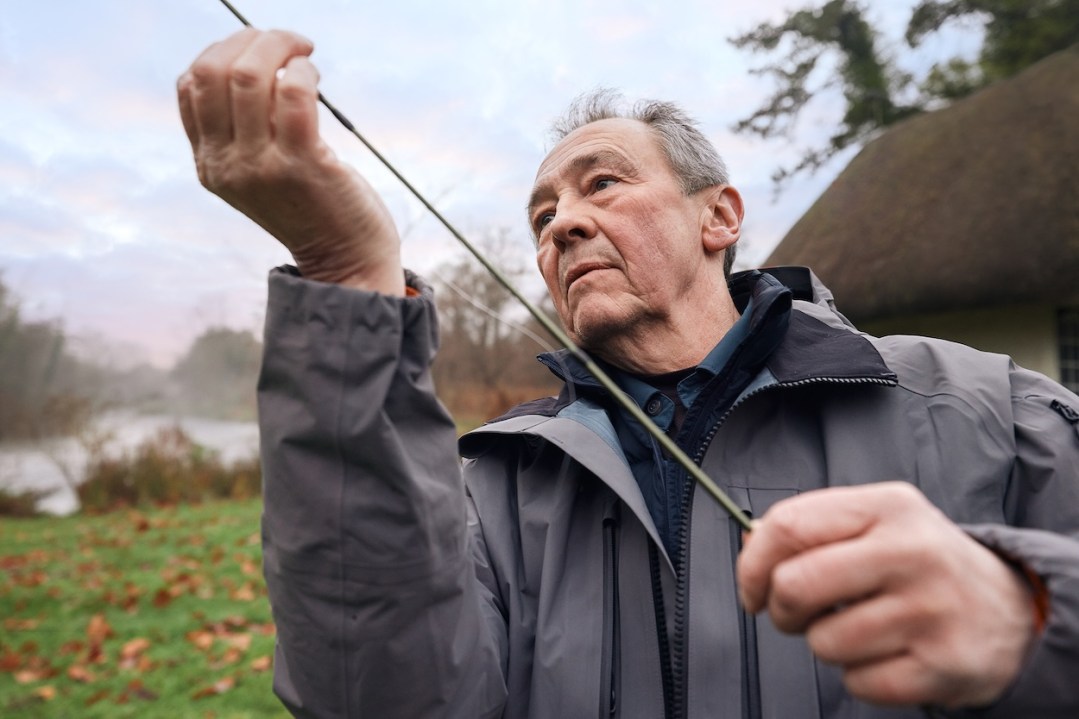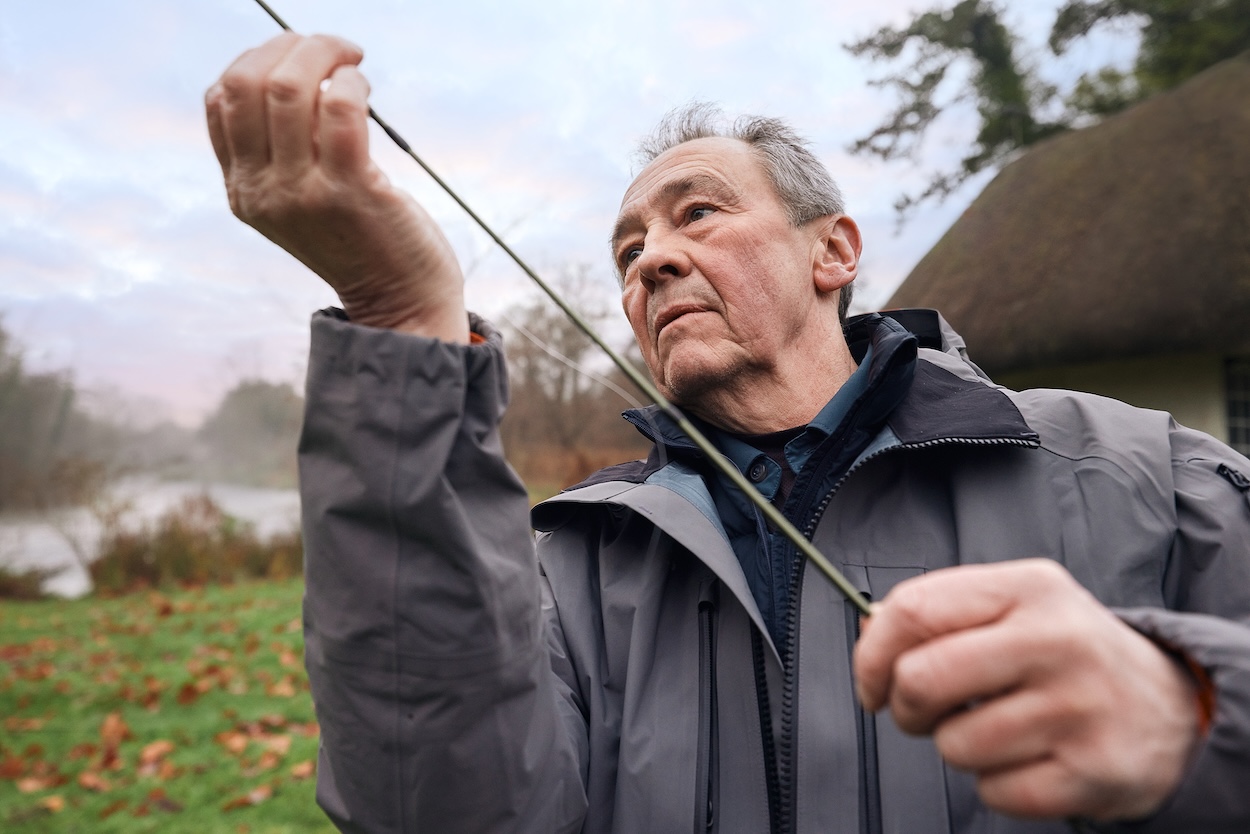The words ‘immersive experience’ have always suggested, to me, a rather strained hour or two smiling patiently at unemployed actors pretending to be ghosts or personages from the olden days or, if I’m really lucky, chocolatiers who are not called Willy Wonka for legal reasons. In fact, all the publicity for the ‘Fish and Feast with Paul Whitehouse’ seemed designed to raise my blood pressure: it was not just ‘with’ the comedian and actor, but ‘expertly curated’ by him and included a session with a ‘wild cooking expert’. Animals, plants, and the man of Borneo can reasonably be called wild; cooking is in the other column with swimming and camping.
‘It might sound like bollocks, but I really don’t mind whether I catch anything or not anymore’
This particular ‘immersive experience’ is a spin-off from Gone Fishing, the television series Paul Whitehouse presents with Bob Mortimer. The programme is an odd mixture of the staged – the ugly dog doesn’t even belong to either of them! – and the genuine: its charm is entirely reliant on the friendship between the two men.
‘It totally came out of real life,’ Paul says, ‘Bob wanted to go fishing with me for years and we never got round to it. Then he had his heart problem, I said come fishing. We came here, we came back… And one day I went, “Bob, you know what, we’ve made each other laugh, we’ve marvelled at the Timeless Wonder of the English Countryside.” We might as well get paid for doing this. “Well, there are many hoops to jump through before that happens… But yeah.”’
Even before then, Paul was visiting the river Test with his father: one of the first things he bought when he became successful 30 years ago was a half-rod (the right to fish alternate weeks) on the Test as a birthday present for the man who had taught him to fish. ‘It’s close to my heart because of that slice of history, with Bob and my dad. And,’ he lowers his voice to a whisper, ‘I think it’s illegal, but there’s a little bit of my dad in the river.’
I begin to realise that ‘curating’ is something more than irritating marketing jargon. Paul is passionate about the Test, fishermansplaining its unique ecology – the only time he seems annoyed is when I tell him I grew up in Wiltshire, so already know what a chalk stream is – and the political campaign to stop its ‘gin-clear’ waters being polluted by storm overflows. Led, he tells me, by his friend, the river keeper from Broadlands, Lord Mountbatten’s estate – ‘You don’t imagine river keepers manning the barricades, seizing control of the means of production – but hats off to them’. Southern Water reversed its plan to discharge into the river.
We arrive at the riverbank on a crisp January morning and start what Paul calls, with a cough of embarrassment, his ‘masterclass’. (There is a fishing pro on hand as well, who does not once contradict Paul.) We are catching brown trout – or, at a pinch, grayling – with a fly; this is more than sticking a hook on a line and hoping for the best (which is the only fishing I have ever done before) and involves flicking an artificial fly lightly on to the surface of the water, mimicking the flies on which the trout (or grayling) feed. The water carries the fly downstream past the waiting fish, which ignores it; and then you pull back the line, whip it behind you and flick again.
‘It might sound like bollocks, but I really don’t mind whether I catch anything or not anymore. I really don’t. But fishing gives you a reason to be by the river, which is compelling and beguiling.’
You start to pay more attention. I have only been casting for an hour, but I can see which parts of the river are slower and which faster, where the weeds are, where each individual fish – the stream genuinely is ‘gin-clear’, that wasn’t just a line to give us an appetite for the ‘wild’ gin-cured trout gravadlax – is watching flies go by; I am much more conscious of my surroundings – where that oak that my line might get caught in is, where the birds which might spook the fish are flying – than I ever am on a walk. After the fishing pro has shown me how he casts a line and changed the fly for a better one, I start to think I’m getting the hang of it.
And Paul is right – it really doesn’t matter if you catch anything. Even if you do, you’ll have to put it back: the only possible reason for catching a fish is so that you have something to pose with in a photo. Since I’m a married man, I have no urgent need of a photo of me holding a fish, for the dating apps, so even that is not much of a reason.
But I have a reason to be by the river. I can almost feel my blood pressure lowering, as I watch the fly float downstream with almost as much lazy disinterest as the trout. My hook gets caught in weeds again. Annoying, as I thought I knew how to avoid them now. I raise the rod to pull the slack out; and then the line starts moving upstream. Weeds, I reason to myself, do not move upstream.
Paul notices the same from further down the riverbank. He canters up and tells me that I’ve hooked a beautiful big grayling. ‘That looks a cracker! Don’t put too much pressure on it!’ I immediately let out some slack. ‘No, don’t let go!’ Too much slack. The fishing pro is wading out with a net, but the grayling has got away. Paul is thoughtful. ‘What I hadn’t done is explained to you, in my master class, what to do if you caught anything. I didn’t think in a million years you would actually hook one.’ It might sound like bollocks, but I really don’t mind.
For the chance to join Paul Whitehouse ‘Originals by GetYourGuide’ experience, entrants can enter via an exclusive free raffle. Ticket availability is limited.







Comments